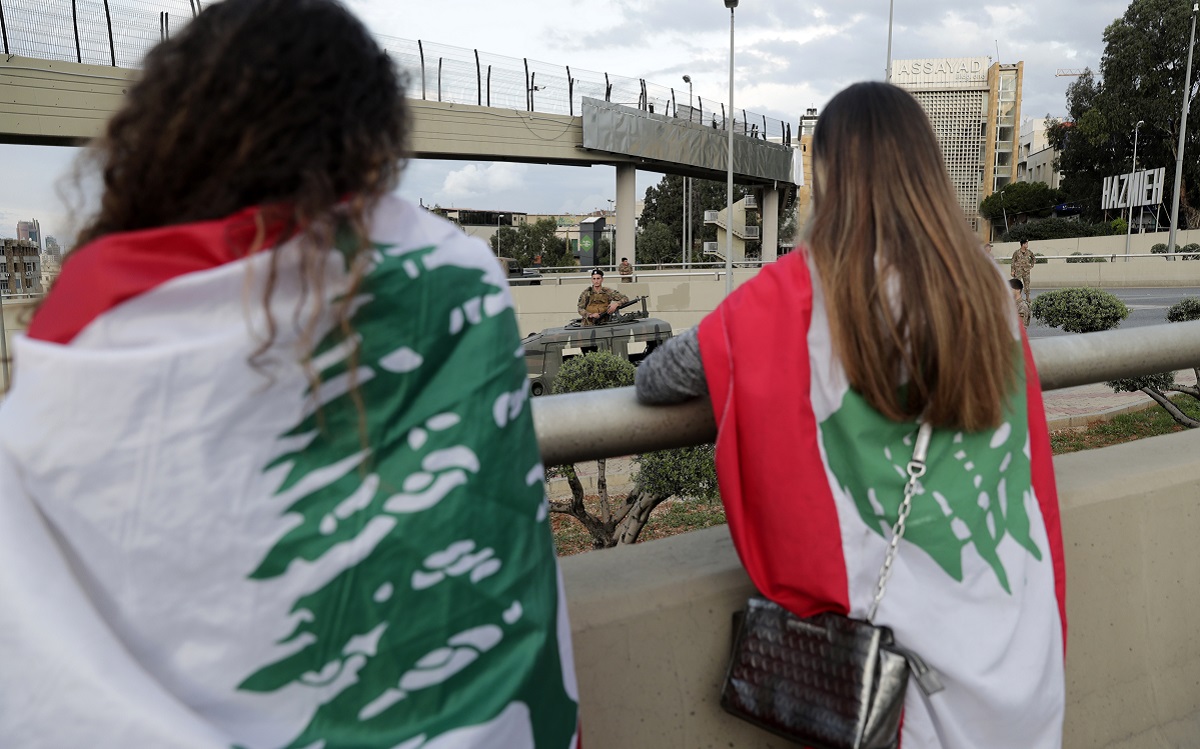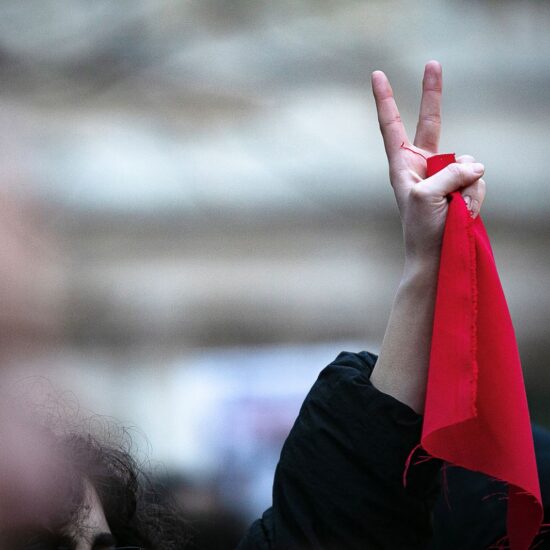
Rayan Charara, a candidate for the MP seat in South Lebanon, found out on social media that her eyebrows did not meet the standards of regional beauty among the young men in her constituency. They were too “bushy,” they said.
Her party, Citizens in a State, submitted the “Qadreen” list with 65 candidates, out of which 16 are women. Although her party colleagues were also the subject of online bullying, Charara had an intense run with bullies attacking her physical appearance.
The bullying campaign also brought her a wave of support from anti-establishment activists that poked fun at the banality of the attacks.
“These people support parties that are not offering any new solutions for the country’s collapse in their political programs … But they prioritize commenting on Rayan’s eyebrows,” one user said.
Women candidates from parties across the political scene in Lebanon go through bullying on social media as well as other forms of intimidation, experts say. On many occasions, women political activists and women politicians in Lebanon have to deal with subtle sexist remarks regarding their appearance and they are ignored or excluded from policy debates and getting insults on social media. Online bullying is also focused on their physical appearance.
The number of women candidates registered for the May 15 General elections is 155 out of 1,043 – 15 percent. Although this shows slight progress since the 2018 poll, which only had 111 registered female candidates, experts and activists say that the country still has a long way to go. A bill aiming to introduce a gender quota developed by several civil society organizations and political science experts from Lebanese universities was dismissed last fall by the Lebanese parliament committee without even being submitted to debate. The bill is still awaiting a real debate and endorsement.
Jamila Khodor, political activist and member of the women’s rights organization Fe-Male, says that the obstacles Lebanese women who get involved in politics face in the public sphere are a direct product of the patriarchy that contributed to the absence of laws that aid women’s participation in politics.
“We can’t blame women for their hesitation to participate in elections. There are many factors working against them that need to be taken into consideration,” Khodor told NOW. “ [Remarks on the physical appearance of candidates] show the weakness of the critics and their inability to find anything substantial to criticize. So they go for the easy target, outer appearances,” she added.
More effort needed
Co-founder of Fiftyfifty, the organization that drafted the women’s quota bill, Joelle Abou Farhat, believes a 50 percent gender quota for women in parliament is crucial to reap significant progress.
“Opposition groups try their best to encourage women to join elections. However, they need to understand that without a concise gender quota that enforces equal participation in parliament, their efforts will remain verbal,” Abou Farhat told NOW.
In Lebanese society voters are accustomed to watching men acquire positions of power repeatedly, which portrays men to be better-skilled politicians, Abou Farhat explained. This is why a quota becomes all the more important to help women gain visibility in the political sphere, she added. Thus, she believes the media is needed to shed light on women’s achievements and contributions.
Moreover, Khodor points to finances as a major obstacle. Since the Lebanese lira has lost more than 90 percent of its value and people struggle to access their savings in banks, the activist said women are financially disadvantaged, thus struggling to procure enough resources for registration and campaigns.
“We have a lot of qualified women that simply don’t have access to the necessary funds to run for elections. You need 30 million LBP to register, billboard ads can cost up to $10,000, and appearances on certain TV talk shows can cost a minimum of $20,000,” she explained.
Tradition and traditional parties
For both Khodor and Abou Farhat, sectarian establishment parties, in particular, are obstacles for women’s participation in politics.
According to the European Institute of the Mediterranean, women constitute 24 percent of the overall labor force and mainly work in the services sector, which is an extension of their traditional role.
Plus, the number of women appointed to Cabinet positions decreased from four in 2019 to only one female minister in Najib Mikati’s current cabinet formed on September 10, 2021.
PM Mikati himself was criticized harshly by civil society for his lack of awareness of the need for gender equality in political appointments. He was also criticized on March 8, when, in his address on the occasion of International Women’s Day, he referred to them as “ key partners” and “companions” without mentioning anything about their deserved political role.
Khodor explained that the establishment was erected upon a patriarchal system that valued men first and women second. This made female partisans subservient to the presidents of the parties and brainwashed to believe their ambitions need to be sacrificed for the greater good of the party.
“These parties not only prefer male candidates and look for women as a mere alternative when they run out of options, they also reinforce the idea that women have to prioritize others before themselves,” the activist said.
Abou Farhat pointed out that, until not so long ago, women members of political parties were reduced to secondary roles of preparing breakfasts, planning events and making coffee. These roles have since evolved and more women are now engaged in decision-making roles with their parties, but that mainly happens within opposition groups.
On the lists submitted to the Ministry of Interior for the poll on May 15, the Amal Movement has one female candidate, the Lebanese Forces also only one, the Free Patriotic Movement also only one, the Progressive Socialist Party has 2, and Hezbollah, which is ideologically opposed to women in political positions has none. Kataeb, an established Lebanese party that resigned from the government in 2016 and whose candidates are now running alongside the opposition, also has one. The rest of 110 women running for office are on the opposition lists or as independents.
Rita Chemaly, professor of Political Science at Saint-Joseph University, explained that the lack of representation of women in politics made it easier for them to become targets of appearance-based criticism, already implemented by discriminatory stereotypes.
“Lebanon is a small community where women are always objectified, especially in the media. So looks were always an integral part of a woman, but they gain pertinence when it comes to leadership skills. The Lebanese tend to attribute wealth and good looks to good leadership,” Chemaly explained.
Stronghold bound by sexist barriers
Parties, groups, and campaigns have until April 4 to form their final electoral lists.
In the South Lebanon electoral district, “The south fights back“, a progressive secular campaign run by the Southern Secular Clubs struggles to find women candidates.
According to Soltan Husseini, a campaign member, vetting women candidates was limited by the south’s conservative Shiite nature.
The first and only woman to make it from the south to the parliament was pathologist Inaya Ezzeddine, 57, who won a seat with the Hezbollah-Amal coalition, in the southern district of Tyre-Zahrani.
Husseini explains that for Hezbollah, keeping women bound to a traditional role was a safer option than opening the door for more opposition.
Lebanon is a small community where women are always objectified, especially in the media. So looks were always an integral part of a woman, but they gain pertinence when it comes to leadership skills. The Lebanese tend to attribute wealth and good looks to good leadership.
“For the political party, equality opposes their traditional Shiite values so instead of opening the door for more progress and change, might as well leave the door tightly shut,” he said.
Another factor that can deter women from joining, Huessini said, is the aggressive nature of opponents, characterized by smear campaigns and physical threats. For this reason, the campaign is not able to implement a quota for women. “We don’t have the privilege to choose the number of women we want to have on our lists, we’re struggling to find candidates as it is,” the student said.
Abou Farhat, on the other hand, believed women candidates are present all over the country but that more effort needs to be exerted to find them and offer them safe spaces in which they feel empowered. As for the attacks, she said laws were necessary to protect women from these aggressions.

Female leadership and change
Rabab Yahya is a 25-year-old Political Science Postgraduate at Universitat Autonoma de Barcelona. She says she has always seen herself running for parliament. She told NOW that although she was the target of bullying and harassment on social media, she refused to detail her experience because she said this would give bullies her attention and would override the election’s main message: the political program.
“I believe this is a natural reaction to seeing new faces running in opposition groups against traditional parties. They don’t intimidate me, I expected it,” she said.
The candidate added that in addition to having female representation in parliament, advocates for feminist projects and reforms from both genders were imperative for change.
“Women’s participation is not enough if feminist projects are not carried over to parliament. We can’t risk having male or female parliamentarians reinforcing old discriminatory rules and regulations,” Yahya said.
Shemaly explained that novelty can also become an obstacle for new candidates. In a crisis similar to that of Lebanon, people prefer to vote for familiarity and not for novelty. Keeping the system as it is, she said, was perceived as a safer option by many, especially by men benefitting from the old patriarchal system.
“As long as the boat is up and running, why bother to switch to a new one? That’s how they perceive the current situation,” she said.
For Abou Farhat, “men in politics aim for power, women in politics aim for change.”
She said the country needs both perspectives and stressed that women offered a distinct way of leadership that prioritized collective needs over individual needs.
“We need women to solve women’s issues. We can’t keep abiding by masculine laws and regulations that deprioritize women and neglect their basic rights,” Abou Farhat said.
Dana Hourany is a multimedia journalist with @NOW_leb. She is on Instagram @danahourany and Twitter @danahourany.








